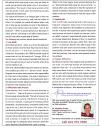Published: September 19, 2007


Read Our Latest Psychobabble newsletter: Most people do not know where to turn when sexual problems creep up. Dr. Marelize Swart, B.C. Registered Psychologist # 1615 and AASECT Board Certified Sex Therapist, has written this months’ Psychobabble Newsletter where she outlines some of the common female sexual concerns.
Published: September 19, 2007
Alzheimer’s disease is still a mystery to people of different races and a large percentage of people across the board are unaware that treatments are available to reduce symptoms.
This is one of the surprising findings in a national survey, “Public opinion about Alzheimer’s disease among Blacks, Hispanics, and Whites,” which was analyzed by researchers at the University of Michigan School of Public Health. Understanding racial and ethnic influences on knowledge and beliefs about Alzheimer’s is critical to communicating risk reduction strategies, symptom recognition, diagnosis and illness management, the paper said. [continue reading…]
Published: September 19, 2007
Subtle discrimination is more taxing on the brain
While certain expressions of racism are absent from our world today, you do not have to look very hard to know that more subtle forms of racism persist, in schools and workplaces and elsewhere. How do victims experience these more ambiguous racist messages” Are they less damaging than overt hostility” And what are the mental and emotional pathways by which these newer forms of discrimination actually cause personal harm” [continue reading…]
Published: September 19, 2007
New Report Says Need is Greater as Information Grows
For the 10 million Americans who are living with cancer or have survived it, one factor may be most indispensable for keeping their spirits intact: communication. In recognition of this, the National Cancer Institute plans to issue a special report by November 1, co-authored by a University of Rochester physician, stating that effective communication is truly essential to good cancer care and deserves more research. [continue reading…]


